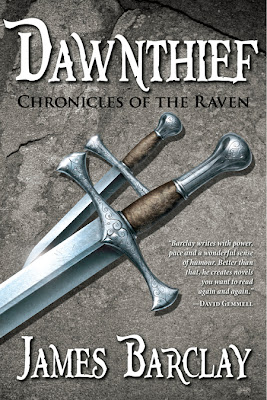Dawnthief by James Barclay
Imagine a world where instead of hiring hobbits as saviours, Gandalf went and found mercenaries who share a spiritual fraternity with Conan the Barbarian. Then imagine that, instead of being a grandfatherly figure, Gandalf's a young, arrogant, manipulative bastard. Pretend that, instead of being noble enough to eschew using the One Ring, every nation and power player in the land are prepared to use the Dawnthief, an extinction-level spell, to their advantage. There is no Rivendell, no last homely house where the heroes can rest between excursions. One of them will be dead in the first twenty pages, just to show our author means business. Half of the remaining heroes will either die or abandon hope and their companions before the quest is completed. Imagine all these things, and you've got a handle on what to expect from Dawnthief, the first book in James Barclay's pulp-fantasy series, Chronicles of the Raven.
I've been wanting to read Barclay's series for years, based upon descriptions of the series as : I picked up copies of individual books from the series here and there, but longed to get the chance to read the series in its entirety. PYR's re-release of both Raven trilogies, Chronicles of the Raven (Dawnthief, Noonshade, Nightchild) and Legends of the Raven (Elfsorrow, Shadowheart, and Demonstorm), have permitted me the chance to do just that.
The Raven--"six men and an elf, sword for hire in the wars that have torn apart Balaia--is a mercenary group living in a secondary world predicated on the ethics of force. Balaia is a violent world, requiring violent solutions. The book opens in media res, with the Raven ready to decisively enter a battle as surgical strike. Their mode of combat is about guarding your partner, like the Hoplites of Sparta, and when this is abandoned, one of the Raven loses their life. This opening reveals two things about Dawnthief: the loyalty code of the Raven, which figures largely into the character arcs, and Barclay's willingness to kill major characters. Like the mercenaries in Predator, none are safe. The brutality of Balaia touches all, and the body count is considerable on both sides of the conflict. Further, because the ethics of Balaia are those of a dog-eat-dog world, the nobility of the Raven's quest to save the world isn't shared by all in that world. Real-world dynamics of power and corruption affect the heroes' journey, and they are as likely to be betrayed or abandoned by allies as helped. This is why the code of the Raven is one of the character keys to this novel: if it feels episodic, then you're not paying enough attention to the character journeys. The melee and mayhem are backdrop to the relationships, and the theme of loyalty. The Raven hold each other above even the salvation of the world--they'd rather let the planet go to a literal Hell, than betray each other and the oaths they've taken.
Maybe I've just been nose-to-the-grindstone with my steampunk research too long, but Dawnthief was a refreshing read for me. Barclay is no Mieville in wordsmithing, but he his narrative is compelling, pacing between intense-can't-put-it-down passages and moments where, were Dawnthief a film, you'd have a chance to go to the bathroom. Maybe it's a Dungeons and Dragons thing. Barclay readily admits the Raven's RPG roots, which is evident without being awkward in the narrative: Powerful magic works immediately, and individual spells have names. You can almost hear the dice rolling above the din of combat. Despite these roots, Barclay's fantasy equivalent of a Black Ops team isn't entirely derivative. Barclay takes fantasy ideas that have been worked before, but as Dawnthief is really a character-driven story, gives them new life. We aren't just told a magician experiences pain at the loss of a familiar, we experience that pain through the magician's thoughts and feelings. We don't just see the resurrection of a dead hero, we also learn of the emotional consequences a stolen death has on a man who had chosen the moment and manner of a good death. We weep with a mother over loss, thrill to the invasion of an enemy stronghold, and cheer when the outsider finally says, fully embracing the Raven's code of loyalty, "Raven with me."
From the publisher:
Isolated, Betrayed, and Facing the End.
The Raven: six men and an elf, sword for hire in the wars that have torn apart Balaia. For years their loyalty has been only to themselves and their code. But that time is over. The Wytch Lords have escaped and The Raven find themselves fighting for the Dark College of magic, searching for the location of the Dawnthief. It is a spell created to end the world, and it must be cast if any of them are to survive.



Comments
Post a Comment